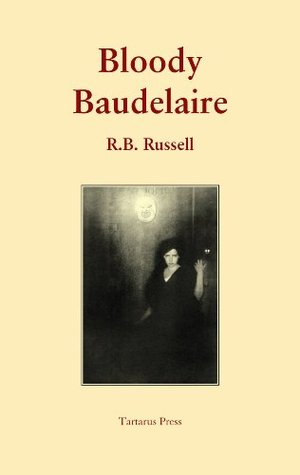 By R.B. RUSSELL (Tartarus Press; 2009/12)
By R.B. RUSSELL (Tartarus Press; 2009/12)
This novella, the first by R.B. Russell, is the essence of low key, or quiet, horror: literate, restrained and elegantly drafted, with a decadent flavor redolent of the output of its original publisher Ex Occidente Press (which specializes in neo-decadent fiction). I think the orgasmic blurbs BLOODY BAUDELAIRE has received are a bit excessive (example: “Russell is a master of subtlety, enfolding the reader in a smart net of elegant prose and ambiguous facts”), but it is a diverting little tale that leaves a pleasing gothic aftertaste.
The naïve young Lucian Miller is drawn to the ancient Cliffe House, entranced by its atmosphere of “decay and grandeur.” While staying there with his haughty girlfriend Elizabeth, Lucian makes the acquaintance of the House’s proprietors, the painter Gerald and his elegant wife Miranda.
Lucian is taken with Miranda from the start, but isn’t at all pleased with Gerald. He, frankly, is a pretentious asshole obsessed with Baudelaire, leading Miranda to constantly grumble about “Bloody Baudelaire.” Their relationship, it transpires, is quite strained, and hides an incriminating secret.
As night falls and shadows descend, Lucian unwisely agrees to a card game with Gerald. The latter is humiliated when Lucian beats him on multiple occasions, leading to an altercation between Gerald and Miranda. Lucian drinks himself into oblivion, and awakens to find that Elizabeth has left and Gerald has disappeared. The only other inhabitant of Cliffe House is Miranda—allowing, it would seem, for a consummation of the simmering passion between her and Lucian, but far darker things are in store.
A nasty secret is revealed in the final pages that’s not exactly difficult to foresee (hint: it involves Gerald’s disappearance and Elizabeth’s complicity in it). That, however, points up a large part of BLOODY BAUDELAIRE’S old-world charm: it reads like a genuine product of a time when “surprise” endings like the one on display here were genuinely surprising.
